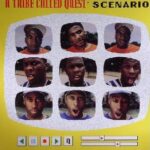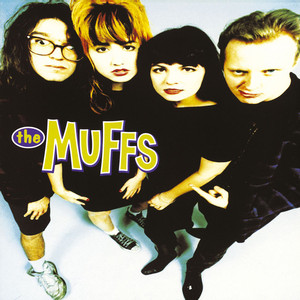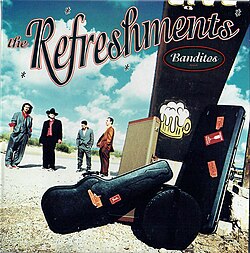 There’s a reason “Scenario” still explodes from speakers with the same raw power it had when it dropped in 1992—it’s not just a rap song, it’s a cipher in motion, a friendly firestorm of lyrical flexing, a joyful competition where every MC throws their hardest punch, yet somehow everyone wins. A Tribe Called Quest’s The Low End Theory is already a landmark in hip-hop, blending jazz cool with street-smart poetics, but its closer, “Scenario,” is something different entirely. It’s the sound of a party that never ends, a pure adrenaline rush of wordplay, rhythm, and charisma that still defines what an all-star posse cut should feel like.
There’s a reason “Scenario” still explodes from speakers with the same raw power it had when it dropped in 1992—it’s not just a rap song, it’s a cipher in motion, a friendly firestorm of lyrical flexing, a joyful competition where every MC throws their hardest punch, yet somehow everyone wins. A Tribe Called Quest’s The Low End Theory is already a landmark in hip-hop, blending jazz cool with street-smart poetics, but its closer, “Scenario,” is something different entirely. It’s the sound of a party that never ends, a pure adrenaline rush of wordplay, rhythm, and charisma that still defines what an all-star posse cut should feel like.
“Scenario” isn’t just a song—it’s an energy. It’s that exact moment when hip-hop stopped just being a genre and became a full cultural collision, pulling in new voices, wild humor, and a competitive spirit that made every verse feel like an event. It’s both chaotic and disciplined, fun and ferocious, and nearly 35 years later, it still makes people hit rewind just to catch everything that flew past their ears the first three times.
The Perfect Storm of Creativity
By 1992, A Tribe Called Quest had already revolutionized rap once with People’s Instinctive Travels and the Paths of Rhythm, but The Low End Theory took things to another dimension. The beats got deeper, the rhymes tighter, and the grooves darker. The album’s flow is hypnotic, jazzy, and cerebral—until the final track bursts in like a rocket launch.
“Scenario” is that sonic exhale, the point where all the laid-back grooves suddenly erupt into a joyful explosion of raw hip-hop spirit. The song’s beat, built around a loop from Brother Jack McDuff’s “Oblighetto,” hits with irresistible punch. There’s a bounce in the drum pattern that feels alive—like it’s daring you not to move. And over that beat, Tribe’s two main MCs—Q-Tip and Phife Dawg—link up with the rising stars of Leaders of the New School, including a young, uncontainable Busta Rhymes.
What makes “Scenario” such lightning in a bottle is the chemistry. You can hear the friendship, the competition, the spontaneity. It sounds like a session that went from a hangout to a historic event without anyone realizing it. Each verse stacks energy on top of energy, building toward that final, explosive moment when Busta Rhymes storms in with his immortal line: “Watch as I combine all the juice from the mind…”
A Lesson in Rap Dynamics
Every great posse cut works because each artist knows their role, and on “Scenario,” everyone delivers their best version of themselves. Q-Tip opens the track with his signature cool detachment, setting the vibe and establishing the groove. He’s the ringleader—the calm before the chaos.
Then Phife Dawg jumps in, and immediately the track feels like it’s leaning forward. His verse is packed with punchlines, self-deprecating humor, and sharp flow. Phife’s delivery is pure personality—confident, funny, and endlessly quotable. His lines about being “short, dark, and handsome” and his playful swagger give the song its pulse.
By the time the Leaders of the New School arrive, the energy has multiplied. Dinco D and Charlie Brown deliver solid verses, but the crowd knows something big is coming. There’s a spark of anticipation that builds through every bar—because everyone knows who’s closing this thing out.
When Busta Rhymes finally enters, it’s like a bomb going off. His verse doesn’t just end the song; it detonates it. His delivery—animated, unhinged, and almost theatrical—completely changes what a rap verse could be. It’s rhythm as performance art, words turned into fireworks. “Rawr! Rawr! Like a dungeon dragon!” became an instant catchphrase, the kind of moment that burns into pop culture permanently.
Even decades later, you can hear how this verse catapulted Busta Rhymes into the stratosphere. It’s a star-making moment in real time—a transformation caught on tape.
Why “Scenario” Still Works
What’s remarkable is how timeless “Scenario” sounds. Most early ’90s hip-hop, as great as it is, feels rooted in its moment—the slang, the samples, the production textures. But “Scenario” transcends all that. It feels alive, electric, and modern no matter what decade it plays in.
That’s because it captures the essence of hip-hop’s social spirit—the cipher, the camaraderie, the competition. This isn’t just studio magic; it’s human connection. You can hear people having fun, trying to one-up each other, throwing their best shots with huge grins on their faces. That authenticity gives “Scenario” an eternal freshness.
It also doesn’t hurt that the beat is perfect. The way the bassline pops and the drums skip gives it an irresistible momentum. It’s funky but hard, lighthearted but fierce. Every kick and snare lands with purpose, giving the rappers just enough bounce to ride but enough space to show off their flow.
And those little details—the “Bo knows this!” callout, the “Here we go, yo!” chants—make it feel like a communal performance. You can practically see the heads nodding and hands waving in the studio.
The Birth of the Modern Posse Cut
Before “Scenario,” hip-hop posse cuts were mostly a showcase of collectives, with everyone getting a verse but not necessarily building toward a unified moment. Tribe and Leaders flipped that idea. Instead of just stacking verses, they built momentum. Each MC pushes the next one higher, like a perfectly choreographed relay race that ends in a sprinting finish.
This structure inspired countless songs that followed—from Wu-Tang Clan cyphers to “1Train” by A$AP Rocky and “Monster” by Kanye West. You can trace a direct line from “Scenario” to every multi-MC track that tries to capture lightning in a bottle. It’s the blueprint for the rap equivalent of a blockbuster finale.
Even in live performances, “Scenario” feels unmatched. When Tribe reunited with Busta Rhymes onstage for it, the crowd reaction was primal—every lyric shouted, every hand in the air. It’s a song that lives equally well in headphones or in a sea of thousands.
Lyrical Brilliance Hiding in the Chaos
Because “Scenario” is so explosive and fun, it’s easy to overlook how technically sharp it is. The rhyme patterns are intricate, the cadences shift constantly, and the wordplay is layered. There’s no wasted syllable. Q-Tip and Phife’s interplay is seamless—one line flows into the next like a handoff in a perfect rhyme relay.
Even Busta’s wild energy is built on skill. His breath control, timing, and rhythmic play are masterclass level. He bends language into rhythm, turning words into percussion. The way he syncs up syllables with the beat’s off-kilter rhythm was revolutionary for the time.
This is the sound of rappers at the height of creativity—before formulas, before streaming, before algorithmic playlists. Just pure artistic instinct and joy.
The Cultural Ripple
“Scenario” wasn’t just a hit—it was a cultural flashpoint. It helped break A Tribe Called Quest into the mainstream while solidifying their artistic credibility. It introduced millions to Busta Rhymes, who would go on to become one of the most distinctive voices in hip-hop history.
And beyond that, it symbolized the golden era of hip-hop collaboration. The early ’90s were full of crews—Native Tongues, Wu-Tang, Boot Camp Clik—where unity and individuality coexisted. “Scenario” captured that perfectly. It celebrated diversity of style and personality within a shared purpose.
It also blurred the lines between underground and mainstream. Despite being playful and fun, it wasn’t lightweight. It had bite, flow, and bars that stood up to the hardest of MCs. For many fans, it was the first rap song that felt like everyone could love it—backpackers, partygoers, even casual pop listeners.
Legacy That Never Faded
Three decades later, “Scenario” still lands like a meteor. It’s been sampled, referenced, and quoted endlessly. Drake, Kendrick Lamar, and Tyler, The Creator have all cited it as an influence. It appears in films, commercials, and every DJ set that wants to ignite a crowd.
When people talk about the “golden era” of hip-hop, they often point to this song. It’s the purest distillation of what made that era special: inventive beats, friendly competition, community, and unfiltered joy in creation.
“Scenario” also stands as a reminder that hip-hop can be both intelligent and fun, both intricate and accessible. It didn’t need to compromise to cross over—it just needed to be great.
And maybe that’s the best lesson of all. Great art doesn’t need explanation; it just needs energy, confidence, and a spark that can’t be contained.
A Final Word
“Scenario” isn’t just one of the best songs in A Tribe Called Quest’s catalog—it’s one of the best in hip-hop history. It’s the rare track where everything aligned perfectly: the chemistry, the timing, the beat, and that immortal Busta Rhymes verse that still gets crowds roaring decades later.
It’s a reminder of why people fell in love with hip-hop in the first place. The wordplay, the humor, the rhythm, the sense of play—it’s all there. It’s friends showing off and pushing each other, creating something that feels both spontaneous and timeless.
Play “Scenario” today, and it doesn’t sound dated—it sounds alive. The drums still punch, the verses still pop, and that hook still makes people yell along like it’s 1992 all over again.
There are technically better-produced songs, maybe even smarter ones—but none that feel as joyous, as unfiltered, or as explosively human as “Scenario.” It’s a lightning bolt caught on tape, a perfect hip-hop storm that has never stopped rolling thunder.



